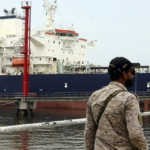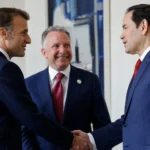Energy News Beat
The last year has shown significant shortcomings when it comes to West’s ability to use economic statecraft as a tool in international politics. Almost all schemes developed to weaken potential opponents have either failed or were less effective than expected.
Lets begin with Russia: In order to drain the financial resources that enable Moscow’s war in Ukraine, the G7 nations implemented a price cap of $60 per barrel on Russian oil. This measure was intended to maintain global energy supply stability while constraining Russia’s war capabilities. Despite these intentions, however, reports from the Financial Times indicate that almost no Russian oil has been sold below this cap, undermining the effectiveness of the policy. The situation is further complicated by the fact that not all G7 members have uniformly adhered to the cap. Japan, for instance, secured an exemption allowing it to import Russian crude oil at prices exceeding the $60 threshold until June 28, 2024 – highlighting the challenges in maintaining a cohesive front among allies.
Moreover, the imposition of the price cap has inadvertently spurred a surge in black market activities for oil, demonstrating the lengths to which nations will go to secure access to this vital resource. The US has taken steps to enforce the price cap, targeting crude traders and shipping entities, but the overall efficacy of these measures remains questionable.
In conclusion, while the G7’s price cap on Russian oil was designed with the goal of curtailing Russia’s revenue streams, the reality of international oil trade and the strategic importance of energy have rendered the cap less effective than hoped.
As the team behind Substack’s most read Blog, Doomberg, told Brussels Signal the entire concept was flawed from the beginning. A commodity exporter cannot be weakened with export restrictions, since they make up the loss in volume via price. The right strategy would have been to flood the market with energy, thereby collapsing global prices and the Russian economy.
The financial cushion Putin as accumulated is being put to good use, including buying European and US-American high-tech. Russia managed to import over $1 billion worth of advanced microchips from U.S. and European companies in the previous year. Using third countries like Turkey, Saudi Arabia, or the nations of Central Asia allows Russia continued access to needed technology, and it demonstrates that Moscow is not as isolated as it seems.
In a similar fashion, the US strategy to cut off China from semiconductor technology seems to disappoint as well. The Dutch company ASML, which is the world’s only producer of the necessary machinery to make sophisticated semiconductors, was subject to a secret agreement between the US and the Netherlands to limit exports to China. ASML, has been instrumental in advancing the semiconductor industry with its photolithography machines, which are crucial for producing computer chips.
While ASML’s most advanced technology, extreme ultraviolet (EUV) lithography, has been banned from export to China since 2019, the company’s second-most advanced machines, the immersion deep ultraviolet (DUV) systems, were not initially subject to such restrictions. These DUV systems utilize deep UV light to print minuscule features that form the basis of microchips and have been pivotal in enabling significant progress in chip manufacturing.
A downturn in global demand, however, resulted in ASML lobbying the Dutch government for increased exports – and they are showing effects: Despite export controls, ASML’s DUV lithography machines have facilitated a notable breakthrough in Chinese chipmaking. Semiconductor Manufacturing International Corporation (SMIC), using ASML’s equipment, managed to produce a 7-nanometer chip. The revelation of China’s ability to manufacture such advanced chips has raised concerns in Washington, as it suggests that China’s semiconductor industry might be reaching a level of self-sufficiency that could be difficult to curtail.
Sanctions, as they so often do, turn into what the former US Secretary of State George Shultz called “a wasting asset.” He describes the fact that imposing restrictions on certain goods will only motivate the target-country to develop those goods with their own technological capabilities. When asked about the history of sanctions, the energy expert Anas Alhaji told Brussels Signal that the story is almost always the same: “In the end, they always fail.”
ENB Top News
ENB
Energy Dashboard
ENB Podcast
ENB Substack
The post Sanctions nearly always fail: That is the lesson the EU and the United States should take from their vain attempts to curtail Russia and China appeared first on Energy News Beat.








